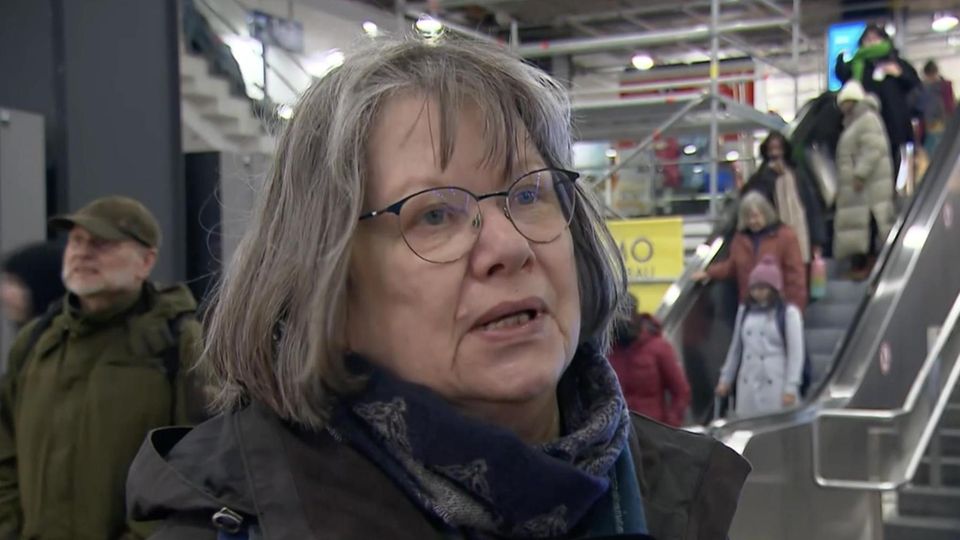Press reviews
Train driver strike: “What an imposition”
Whose reputation will be more damaged by this fifth strike, that of the railway or that of the train drivers’ union GDL?
© Julian Stratenschulte / DPA
In the current rail strike, anger towards Claus Weselsky, head of the train drivers’ union GDL, is particularly great. However, he has reasons why he insists on the 35-hour week.
The restrictions on Deutsche Bahn’s long-distance, regional and freight transport due to the strike by the train drivers’ union GDL will continue on Friday. Although it should The strike only officially lasts until 1 p.m. But the company said the company would stick to the limited basic long-distance service throughout the day. Only one in five trains is currently traveling there. In regional and S-Bahn transport, however, the service is to be gradually increased again over the course of Friday, it was said.
The strike by the German Locomotive Drivers’ Union (GDL) has been causing widespread disruption to rail traffic since Thursday morning. It is the fifth strike in the ongoing collective bargaining dispute and should last 35 hours each for passenger and freight transport. There is no agreement in sight. GDL boss Claus Weselsky therefore wants to announce future labor disputes with significantly less notice. This further increases the uncertainty for passengers on rail.
The media response to the train drivers’ strike
“Reutlinger General-Anzeiger“: “Weselsky is overstepping. If the train is not a reliable means of transport, it runs counter to the goals of the transport transition. Thousands of jobs are at risk – namely those of the people for whom he is currently pretending to be fighting. But there is positive news here too: It is Weselsky’s last industrial action.”
“Südwest Presse” (Ulm): “The train driver boss doesn’t want an agreement, he wants to get his maximum demand, he really has to get it. The reason: He has agreed a collective agreement with 28 other transport companies on the gradual introduction of the 35-hour week. However, the contracts only come “This will come about if the DB also agrees to this reduction in working hours. Weselsky has thus maneuvered himself into a trap. The more time passes, the more strikes come, the less he will be able to convey his fight to the public.”
“Frankfurter Allgemeine Zeitung”: “The Greens don’t want to be caught thinking that collective bargaining autonomy and the right to strike (…) might have to be designed differently. The Union and the FDP also understandably didn’t want to get a reputation for anti-employee in the past. So the legislature left it to them in a cross-party inaction Courts to regulate the right to strike – or not. But things cannot continue like this, and not just because of the immense economic damage. If millions of travelers are taken hostage again and again so that someone can leave the collective bargaining battlefield as the winner, then they can “The parties from left to right are no longer avoiding their responsibility for peace and cohesion in society.”

“New Osnabrücker Zeitung”: “It is not the first time that one gets the impression that under the guise of collective bargaining in competition with the much larger railway and transport union EVG, the GDL wants to show who is the stronger representative of the interests of railway employees. It is not surprising that parts “The public and politicians are thinking more and more loudly about restrictions on the right to strike in areas of public services and infrastructure. If it comes to that in the future, Claus Weselsky would share responsibility for it. What an imposition.”
“Leipziger Volkszeitung”: “The current rail strike and those to come are also annoying people in the country because they can no longer understand what exactly it is about. The collective bargaining dispute has become a torturous confrontation of alternative facts and insults. Guilt for that Weselsky is the main one, who carries out a mixture of untrue public relations work and peddling principles; but Seiler is also to blame for this, as he also does not always provide open and clear information about the status of the negotiations.”
“Frankfurter Rundschau”: “Claus Weselsky only has a small circle of fans – that’s all he needs. As head of the train drivers’ union, he has to fight for improvements for the GDL members. Take public opinion into consideration? For Weselsky, this is irrelevant. This was the case in previous collective bargaining disputes a strength of the GDL boss. He might be seen as argumentative, as ruthless – it doesn’t matter, as long as there was a wage increase at the end of the collective bargaining round. In the meantime, Weselsky is not only making things difficult for his opponents, but also for those who sympathize with him. He has misrepresented the two moderators’ proposal and thus justified the wave strikes. In doing so, Weselsky damaged the image of the tough but honestly fighting union leader that he had carefully built up. In fact, the two moderators had suggested reducing the weekly working hours to 36 hours – with full wage compensation . That comes very close to the GDL requirement for a 35-hour week.”

